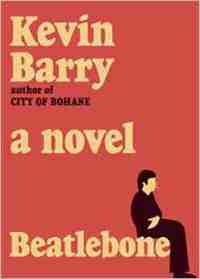Beatlebone by Kevin Barry
 Monday, December 7, 2015 at 8:22AM
Monday, December 7, 2015 at 8:22AM 
Published by Doubleday on November 17, 2015
It’s quite a conceit when a writer puts himself into the mind of a famous subject, particularly one who is as complex as John Lennon. “This is the story of his strangest trip,” we are told. The result is an intimate psychological portrait of Lennon at a particular point in his life, with snippets of a biographical portrait of the man and his era.
The story takes place in May 1978. Lennon is 37. He has fame, wealth, children, and a small island off the coast of Ireland that he visits now and then so he will have a secluded place to scream, a place he can be “so fucking lonely that I’ll want to fucking die.” To help him get to the island without being noticed, he hires a fellow named Cornelius O’Grady who often seems to be pursuing an agenda that does not include transporting Lennon to the island.
Cornelius is a blend of philosopher, advisor, and father-confessor. He is a representative of Temptation and Absolution. His wisdom, based on experience and common sense, is deeper than that of the well paid therapist who has advised Lennon to scream his troubles away.
Blending history with fiction, Lennon’s journey with Cornelius takes him to pubs and various other locations, including the Amethyst Hotel, where the Beatles had stayed nine years earlier. Other guests at the Amethyst draw Lennon into one of those confrontational circles where people rant at each other but Lennon has been there, done that. Lennon has learned that “the examined life” is “a pain in the stones.” That segment of the book, however, gives Kevin Barry a chance to dig more deeply into Lennon’s history and psyche.
When about two-thirds of the novel has passed, the author intervenes and, from a first-person perspective, begins to explain his methods of seeking inspiration for the novel. The narrative turns into the history of western Ireland weirdness in the 1970s with bits of literary criticism of Lennon’s writing, details of Lennon’s life, snapshots of Liverpool, the author’s own experience on the island, and the author’s contemplation of the connection between Lennon’s Irish ancestors and his attempt to find a place in the world.
And then, just as jarringly, we’re back to Cornelius and the world of fiction. The setting changes again as the novel nears its conclusion, when we see Lennon in a recording studio. Lennon rambles about his island experiences during a less-than-successful recording session as he tries to capture something new or true, something meaningful in a world where separating meaning from background noise is a daunting challenge.
Barry’s writing style put me off before it drew me in. The opening pages seem aggressively experimental, as if composed on acid, before the prose settles into a purposeful rhythm. I was particularly taken by the dialog, which often delivers low-key hilarity. Most of the novel is written in short paragraphs, save for the ending ramble and occasional extended paragraphs that impart the details of Lennon’s isolated home life, his paranoia, and his inability to write new songs.
I’m not sure that everything works perfectly in Beatlebone (the author’s intrusion struck me as self-indulgent), but most of the novel works quite well. It is a convincing examination of a gifted but troubled mind, a romp through psychology and philosophy, and an astonishing collection of unexpected sentences. The abundant humor (like Lennon) is wry but the novel (like Lennon) suggests that despite past and present struggles, there is always hope for a brighter tomorrow. Of course, as Barry must have intended, we read the novel with Lennon's fate in mind. Hope and reality, the novel reminds us, do not always coincide.
RECOMMENDED



